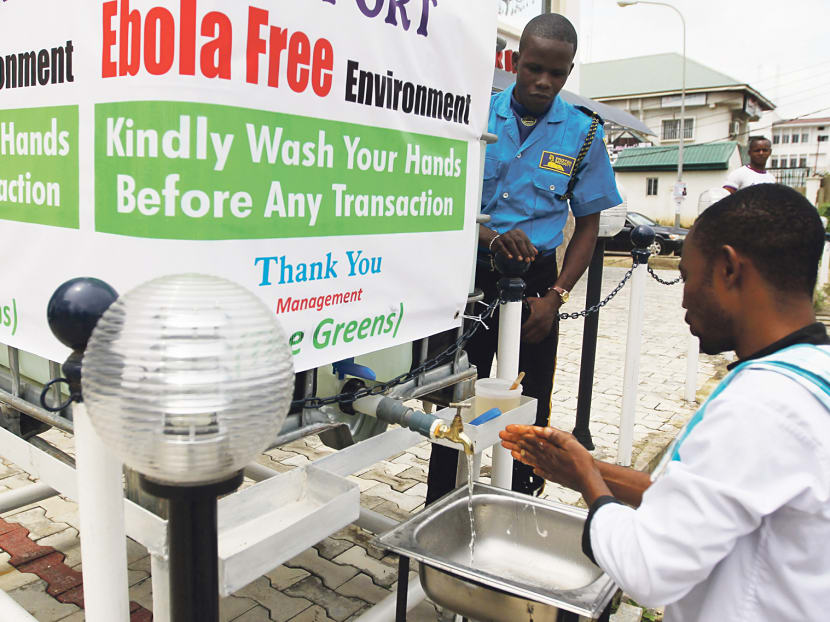Nigeria sets an example in the fight against Ebola
LAGOS — When Liberian development consultant Patrick Sawyer collapsed in the arrivals hall of Lagos airport with the symptoms of Ebola in July, the initial reaction, both inside and outside Nigeria, was close to panic.

A man washing his hands at a tap in Abuja. Nigeria’s organised efforts to contain Ebola have shown the importance of logistics and public information awareness on top of medical care. Photo: REUTERS
LAGOS — When Liberian development consultant Patrick Sawyer collapsed in the arrivals hall of Lagos airport with the symptoms of Ebola in July, the initial reaction, both inside and outside Nigeria, was close to panic.
The fear was that Nigeria’s rickety, overstretched health service would be unable to contain the deadly virus. In a sign of the strains the system was under, Nigerian doctors were on strike for higher pay when Sawyer entered the country.
Against the odds, however, public health officials say one of the world’s more chaotic nations has provided an object lesson in how to deal with Ebola. It is a lesson that could prove salutary for Western governments scrambling to come up with their own response.
For public-health experts, the idea of Ebola gaining a grip in Nigeria — Africa’s most populous nation and largest economy — is a nightmare scenario. There are 170 million Nigerians, eight times the combined population of Guinea, Sierra Leone and Liberia, where the disease is raging. The country’s peripatetic elites and prolific traders have connections across the globe.
Yet Nigeria has quashed its outbreak — and is now just a week short of being clear of a live case for 42 days, the period required by the World Health Organisation before it can be officially declared Ebola free.
“President (Bill) Clinton, when he came here 14 years ago, said that from what he could see there is no problem Nigerians can’t fix if they get together,” says Dr Benjamin Ohiaeri, director at the First Consultants clinic where Sawyer was taken on July 20 and later died.
Like the current case in Texas, Nigeria’s outbreak was the result of a lone traveller entering from Liberia. Dr Ohiaeri’s clinic bore the brunt of the tragedy that subsequently unfolded and it was partly thanks to the courage of his staff in preventing Sawyer from leaving the premises that the disease did not spread further.
Eleven of his staff and their family members contracted Ebola, many in the 48 hours between Sawyer’s admission and the positive result of the laboratory tests. Four of them later died. But Nigeria got its act together quickly after that.
An emergency presidential decree enabled officials to access mobile phone records and empowered them to lean on law-enforcement agencies where necessary to track down people at risk. Thereafter, a strict system to monitor potential cases was put in place by the Lagos state government.
“They were very organised. They put resources into tracking down every contact. In the US, the wife (of the first Ebola victim in Texas) was left for five days with contaminated material. Here they disinfected houses immediately,” says Dr Eilish Cleary, a public health expert on contract to WHO who has been debriefing the Nigerian survivors.
Senegal, which borders Guinea, where the current outbreak of Ebola took root, has been even more successful in containing an initial scare to just one case.
In total 20 Nigerians became infected, of whom eight died. Teams of state officials and volunteers tracked down more than 800 people who had primary or secondary contact with the Sawyer case.
These included the congregations of two churches in the city of Port Harcourt where an infected man had worshipped, according to Dr Tochi Okwor, who runs the public awareness campaign in Lagos state.
In addition, hundreds of private clinics have been trained in identifying Ebola patients and keeping them away from the community until they are evacuated to isolation wards. A social media campaign set up in the wake of the first case by volunteer technology experts, manning twitter handles, web sites and helplines, complemented these efforts.
In the process, according to Dr Cleary and other top World Health Organization officials, Nigeria has shown the importance of logistics and public information awareness on top of medical care in containing the disease.
Nigeria was fortunate that Sawyer entered the country through the airport, into the commercial capital and straight to a top private clinic. The country could be far more vulnerable, according to global specialist in emerging pathogens Simon Mardel, if another case arrives by land, and ends up in a remote public hospital.
But if Ebola strikes again, the country will be better prepared.
“People are determined that they don’t want Ebola in Nigeria. We could have had much higher casualty figures. But within weeks, we would still have got it right,” says Dr Okwor.






